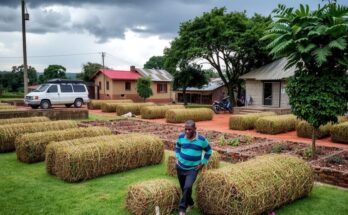The African Development Bank Group has approved grants amounting to $34.8 million to bolster climate resilience in Malawi and Zimbabwe. This funding, part of the ADRiFi initiative, aims to improve disaster risk management capabilities, provide financial protection against climate disasters, and promote index-based crop insurance to support vulnerable communities. The project aligns with the Bank’s broader objectives of enhancing the quality of life in Africa and supporting economic diversification in Malawi.
The African Development Bank Group has sanctioned a substantial grant of $34,796,402.40 to foster climate resilience among vulnerable populations in Malawi and Zimbabwe. This financial assistance is part of the Bank’s Africa Disaster Risk Financing (ADRiFi) initiative under the program “Mitigating Fragility through the Africa Disaster Risk Financing Programme in Southern Africa Project.” The primary objective of this initiative is to strengthen the institutional capabilities for managing and preparing for climate risks. It includes mechanisms for financial protection against climate-induced disasters through sovereign climate disaster risk transfer and the promotion of index-based crop insurance to counteract production risks, such as drought, at the micro-level. Both Malawi and Zimbabwe are significantly impacted by climate-related hazards, including droughts, tropical cyclones, and flooding. These countries often find themselves ill-equipped to manage the risks associated with these climate shocks, which exacerbate their existing vulnerabilities. Thus, it is vital to enhance disaster risk management frameworks, improve early warning systems, and fortify institutional arrangements to enable better preparedness and resilience. The project entails insurance payouts aimed at delivering timely financial support to mitigate losses linked to climate-related disasters. This initiative aims to protect households and businesses from the threats of poverty and bankruptcy. Anticipated benefits from climate risk insurance include fostering behavioral changes among beneficiaries, such as investing in climate-resilient livelihoods and establishing savings for future insurance premiums. This initiative builds on the achievements of the ADRiFi program and integrates contributions from various partners that have bolstered financial resilience in Malawi and Zimbabwe. For instance, during the 2024/2025 drought induced by El Niño, the African Risk Capacity, a collaborator within the ADRiFi framework, provided over $45 million in disbursements to assist farmers adversely affected by the drought, offering vital food support and recovery resources for community rebuilding. This project aligns with the African Development Bank’s High 5 Priorities, particularly focusing on improving the quality of life and enhancing agricultural productivity in Africa. Furthermore, it corresponds with the Bank’s strategic objectives laid out in the 2024-2033 ten-year plan and supports the Country Strategy for Malawi aimed at economic diversification through investments in agricultural infrastructure and value chains.
The African Development Bank Group’s initiative highlights the critical importance of climate resilience, particularly in regions like Southern Africa, which face severe climate risks. Malawi and Zimbabwe, while rich in natural resources, are among the most vulnerable nations to climate change impacts. This grant provision serves as a strategic effort to address existing gaps in climate risk management and to equip communities with the necessary tools and funding to adapt to changing environmental conditions. The focus on strengthening disaster preparedness and financial protection mechanisms is essential to establish a sustainable response to future climate disasters.
In conclusion, the African Development Bank Group’s approval of $34.8 million in grants represents a significant stride towards building climate resilience in Malawi and Zimbabwe. By empowering vulnerable communities with financial protection, enhancing institutional capacity, and promoting adaptable agricultural practices, this initiative aims to mitigate the adverse effects of climate change and support sustainable development in the region.
Original Source: www.afdb.org



